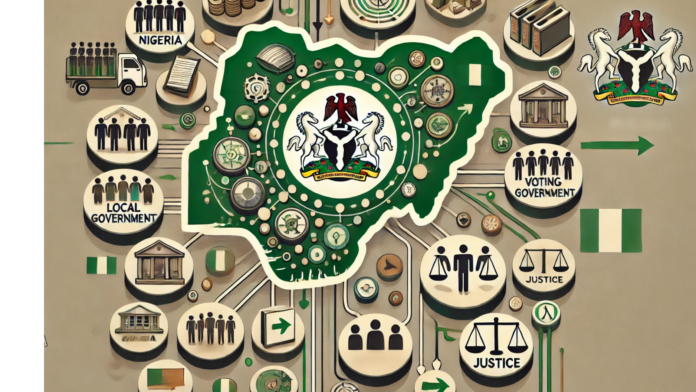Decentralization has become a significant point of discussion in Nigeria as a possible means to improve governance, address regional disparities, and empower local communities. As the country faces challenges such as insecurity, economic inequality, and inefficiency in public service delivery, decentralizing power is seen as a way to create a more balanced and inclusive government structure. In Nigeria, decentralization refers to redistributing authority, resources, and responsibility from the federal government to state and local governments. Advocates argue that empowering subnational governments can help tackle issues more effectively at the grassroots level. This article explores the impact of decentralization on governance in Nigeria, its current status, potential benefits, and obstacles to implementation.
Understanding Decentralization in Nigeria
Decentralization involves shifting power and decision-making authority closer to the people, allowing subnational governments to manage their resources, set policies, and make decisions that address their unique needs. Nigeria’s federal system theoretically supports decentralization, with power divided among the federal, state, and local governments. However, in practice, the federal government holds significant authority, controlling major resources and decision-making processes that affect the states and local governments.
In Nigeria, decentralization is often viewed through three main lenses:
1.Administrative Decentralization: Transferring administrative responsibilities from the central government to local governments. This involves shifting control over service delivery functions, such as healthcare, education, and infrastructure, to local authorities.
2.Fiscal Decentralization: Allowing subnational governments to control their revenue sources and budgetary allocations. Fiscal decentralization can reduce the dependency of states on federal allocations, fostering financial autonomy.
3.Political Decentralization: Granting political power to local representatives, enabling citizens to participate in governance through locally elected officials.
While decentralization has taken hold in some areas, particularly in administrative functions, challenges remain due to Nigeria’s long-standing centralized framework.
The Potential Benefits of Decentralization for Nigeria
1.Enhanced Service Delivery: Decentralization allows local governments to better understand the needs of their communities and respond more effectively. Local governments, being closer to the people, are often more equipped to provide services like healthcare, education, and social programs tailored to the unique requirements of their communities.
2.Improved Governance and Accountability: Decentralization encourages transparency and accountability by bringing governance closer to the people. When local authorities manage resources, citizens can hold their leaders accountable more easily than in a centralized system. Decentralization thus promotes citizen engagement in decision-making and strengthens democratic governance.
3.Reduced Ethnic and Regional Tensions: Nigeria’s diversity is one of its greatest strengths, but it also poses governance challenges. Decentralization allows regions to address specific concerns, minimizing feelings of neglect by the central government. It can also provide marginalized groups with greater control over their resources and cultural identities, promoting unity and reducing ethnic and regional tensions.
4.Economic Growth and Local Development: With greater control over resources, states and local governments can focus on developing their economies based on local strengths and opportunities. For instance, states rich in agriculture or minerals can invest in their industries without waiting for federal support. This economic empowerment can drive local development, reduce unemployment, and alleviate poverty.
5.Efficient Resource Allocation and Utilization: Local governments can allocate resources more effectively because they understand their communities’ specific needs. Decentralization enables faster and more contextually appropriate responses to local issues, ensuring that resources are directed where they are most needed.
6.Enhanced Security and Policing: Nigeria’s current centralized security structure often struggles to address local security issues due to the absence of local intelligence and response capabilities. Decentralization, particularly the creation of state or regional police forces, could improve security by allowing states to address security concerns within their jurisdictions.
Current Status of Decentralization in Nigeria
1.Constitutional and Legal Constraints: Nigeria’s Constitution places significant authority in the hands of the federal government. The exclusive and concurrent legislative lists in the Constitution determine which powers belong solely to the federal government and which are shared with states. Consequently, states have limited autonomy and rely heavily on federal allocations, which limits true decentralization.
2.Fiscal Centralization: Although efforts toward fiscal decentralization exist, most states depend heavily on federally distributed revenue, primarily from oil income. This dependency creates challenges for states in making independent economic decisions, as they lack full control over revenue generation and resource allocation. Efforts to reform revenue-sharing formulas and allow states greater financial autonomy have been slow.
3.Local Government Autonomy Issues: While Nigeria has local government structures, they are often under the control of state governments, with limited autonomy in decision-making. This undermines the potential impact of decentralization at the grassroots level, as local governments are often constrained by state governments in both fiscal and administrative matters.
Key Challenges of Decentralization in Nigeria
1.Resource Imbalance and Economic Disparities: Nigeria’s states differ greatly in terms of resources and revenue generation capacity. States in the Niger Delta have oil resources, while others are more agriculturally based, and some states are heavily reliant on federal allocations. Without equitable distribution of revenue, decentralization may widen the gap between wealthy and poorer states, creating economic imbalances and competition rather than cooperation.
2.Weak Institutional Capacity: Effective decentralization requires robust institutions at the state and local levels. Many local governments in Nigeria lack the institutional capacity, trained personnel, and infrastructure needed to implement development projects or manage resources. This limitation reduces the effectiveness of decentralization and may lead to mismanagement.
3.Corruption and Accountability Issues: Decentralization without strong oversight mechanisms can create opportunities for corruption. Local officials may misuse resources if accountability systems are weak, leading to inefficient service delivery and poor governance outcomes. Nigeria needs effective anti-corruption measures and transparent governance practices at the state and local levels to fully realize the benefits of decentralization.
4.Political Resistance: Decentralization reduces the power of the central government, and this change is often resisted by those who benefit from centralized authority. Political elites in the federal government may be reluctant to devolve powers to subnational governments, fearing a loss of influence and control.
5.Public Awareness and Participation: For decentralization to be effective, citizens must be aware of their role in governance and actively participate. However, many Nigerians remain unaware of how decentralization affects their daily lives or how they can hold local leaders accountable. Educating the public on the importance of decentralization and their role in local governance is essential.
Pathways to Effective Decentralization
1.Constitutional Reforms: To facilitate decentralization, constitutional amendments are necessary to transfer more powers from the federal government to state and local governments. This may include granting states more control over key areas like policing, resource management, and revenue generation. Amending the Constitution to redefine power-sharing arrangements would allow decentralization to be more impactful.
2.Revenue-Sharing Reforms: Revisiting revenue-sharing formulas to allow states greater control over their resources can enable financial autonomy. Such reforms could involve allowing states to retain a greater share of internally generated revenue, encouraging states to develop local industries and reduce dependency on federal allocations.
3.Strengthening Local Institutions: Building capacity at the local level is crucial for successful decentralization. Training programs, improved infrastructure, and better funding for local governments would empower them to deliver services effectively. Investing in local governance structures and human resources can increase the ability of local governments to implement development programs.
4.Enhancing Accountability and Transparency: Establishing effective accountability mechanisms is essential to prevent misuse of resources in a decentralized system. Introducing transparent budgeting processes, independent audits, and citizen oversight committees can enhance accountability and reduce corruption at the local level.
5.Promoting Public Participation and Civic Education: Public engagement is critical for decentralization to succeed. Educating citizens about their rights and responsibilities in local governance would empower them to participate in decision-making processes and hold their leaders accountable. Civic education initiatives could promote greater citizen involvement in local development projects.
The Impact of Decentralization on Governance in Nigeria
If effectively implemented, decentralization has the potential to significantly improve governance in Nigeria. Decentralized power would mean that states and local governments could respond more quickly and effectively to the unique needs of their communities. This localized approach could boost service delivery, foster economic development, and enhance transparency and accountability. Decentralization could also help reduce ethnic and regional tensions by allowing communities greater autonomy and control over their resources.
Moreover, empowering local governments would encourage economic growth and attract investments tailored to the strengths of each state. With greater control over resources, states could improve infrastructure, health services, and educational facilities, leading to a more balanced and inclusive development across Nigeria’s regions.
Conclusion
Decentralization offers Nigeria a path toward more effective and inclusive governance. By shifting authority, resources, and decision-making closer to the people, decentralization can promote transparency, accountability, and development that is responsive to local needs. Although the journey toward decentralization is fraught with challenges—such as constitutional constraints, resource imbalances, and the need for institutional capacity—Nigeria stands to benefit significantly from an approach that empowers local communities. Through constitutional reforms, capacity-building efforts, and public engagement, Nigeria can unlock the potential of decentralization to create a more balanced, resilient, and prosperous nation.



















